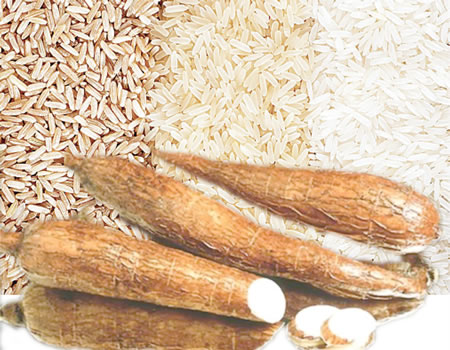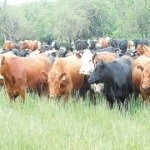Nigeria is a country blessed with 84 million hectares arable land, which is capable of feeding the entire country and also serve as a means of gaining forex through the exportation of agricultural products.
Basically all the agricultural products consumed daily in the country for both domestic and industrial purposes, are grown in large quantity across the country.
Importation of basic food into the country have been long time practice which has discouraged some of our farmers from producing and, also those who produce cannot not find market for their products.
#NigeriaDecides2019 | Atiku leads Buhari in 10 LGAs of Rivers
Importation of food into the country is not outrightly bad, but it should be done with caution in order to encourage local producers and also create jobs and wealth through local production.
Nigeria has entered into many treaties on importation of agricultural products both at the regional, continental and the world level which makes it very difficult for the country to regulate the inflow of these agricultural products.
For the purpose of this write up, I will focus on rice and cassava which form part of the major crops produced in the country and their peculiarity in driving the economy.
Nigeria currently consumes about 7 million tons of rice annually, but our current local rice production is near 7 million tons following the recent Anchor Borrowers Scheme which has boosted rice production across the country.
Meanwhile, the Minister of Agriculture and Rural Development, Chief Audu Ogbeh last year said Nigeria is producing 6 million tons of rice paddy and will increase it to 9 million tons by 2019.
Also in January 2018, Chief Ogbeh said the rice importation would end that year, because according to him, the government has empowered rice farmers through the Anchor Borrowers Scheme to produce enough rice for the country.
“A total of N43 billion was loaned out to farmers, and 293,000 farmers borrowed the money and they produced rice which sold for N193 billion. You can imagine an investment of N43 billion, yielding N193 billion.
“If that is done in 2 years we have another 3 or 4 months, maximum 6 months to run, there will be no need to import rice because what we eat in Nigeria is 7 million tons for now, the number is rising because our population is growing at 3.5 per cent, 1 million tons will fill up 33,000 trailers”, the Minister said.
Ogbeh, however, said soon, with the structures in place and how rice production is growing in the country, Nigeria would commence exportation of parboiled rice to Liberia, Ghana and Sierra Leone.
But with all these promises by the Minister of Agriculture, foreign rice is still very visible in the Nigerian market and are sold very cheap compared to the locally produced rice.
The Nigerian farmers suffer a bit of low patronage because the rice importers continues flooding the market with imported rice at a cheaper rate and customers are easily swayed into buying the imported rice.
The reason why the foreign rice is cheaper compared to the local rice despite paying custom duty and other charges is because these rice are bought at an auction price in Thailand and other countries that produce in large quantity.
As at 2017, the international price of rice per ton is $700, but when countries like Thailand auction their rice which has been in storage for over 7 years and declared unfit for human consumption, they sell it for $150 per ton.
When the buyers approach the Nigerian borders with the rice, they Nigerian Customs will place import duty based on the $150 per ton, at the end, the importers may end up spending just $200 per ton, while the cost of production and other things involved in the production process costs the Nigerian farmer about $700 per ton.
In this case, there will be no fair competition among the two rivals, the importer may choose to sell the rice very cheap per bag and still make profit, while the Nigerian farmer will consider the cost of production and profit which at the end of the day will make the local rice more expensive.
This singular act ends up discrediting the efforts of the government in rice production and keeps discouraging the Nigerian rice farmers to continue producing.
The government is not also relenting in taking steps to end this importation and make Nigeria self reliant in rice production, Chief Ogbeh in 2017 said that efforts were been made to achieve 7 million tons rice production soon.
“We are aiming to hit seven million tons by the middle of next which is our National consumption, we want to go beyond that.
“I have been to Vietnam, there is nothing they have done in rice production that we have not done; the only thing we need to do now is to increase our milling capacity which we are increasing.
“Our milling capacity is still not up to speed, we are going to achieve that, and once we do, we have no argument with anyone about whether we are producing that quantity or not”, Ogbeh said.
Ogbeh said that government had begun the distribution of about a hundred rice mill across the country. He said some of the mills will be distributed to Cooperatives and communities, and the terms of distribution will be favourable.
His words: “We have a hundred rice mills for distribution, some can mill 10 tons per day, which will mainly go to cooperatives, some will mill 20 tons per day, while some will mill 50 tons per day and 100 tons per day and the terms of sale and distribution to communities will be very generous.”
Currently, Nigeria is the largest producer of cassava in the world. Nigeria has an average production of over 45 million metric tons which represents about 20 per cent of global cassava production.
Being the largest producer of cassava in the world, Nigeria is still importing some of the raw materials of cassava for industrial and domestic use.
Meanwhile, in Nigeria there are many companies and industries both large and medium scale that can process cassava and extract those raw materials to satisfy local demand.
It’s is on record that Nigeria has the best cassava in the world with the largest concentration starch which is majorly what these industries need to as raw materials.
Nigeria’s annual requirement for starch is about 600,000 tons, and a ton is sold for N220,000, that means the annual value of starch in the Nigerian market is N132 billion.
Imported starch is sold for about N150,000 per ton, while the locally processed starch is sold for about N220,000 per ton, this is exactly why manufacturers prefers to patronize the imported starch instead of its local counterpart.
Infrastructural deficit as has been a major contributory factor to why the locally processed starch is more expensive than the imported starch. The processors provide electricity, water, even roads by themselves.
Currently, importers of starch are charged 5 per cent to 10 per cent import duty, which still makes them sell starch at a very low price, compared to local manufacturers who are faced with many challenges including infrastructure deficit and difficulty is sourcing raw materials, which makes them produce at a very high cost, thereby making their products more expensive than the imported starch.
Local processors have called on the government to increase the import duty on imported starch to about 60 per cent, this will force the price of imported starch up, and there by giving room for the local starch to compete favorably.
Large scale cassava farmers depend on these local processors to buy their products, but when these processors don’t get patronage from local buyers of starch, they will not buy cassava from farmers, and the farmers will be discouraged to produce.
So, this cassava value chain needs to be taken serious by the government because majority of farmers in the Southern part of the country are cassava farmers and they need to be encouraged to produce.
Cassava have other raw materials which are needed in large quantity, but a large chunk is sourced through importation while a meager quantity in sourced locally. The raw materials include, syrup for pharmaceutical companies, ethanol for beverage production and so many others.
Government need to formulate policies that will encourage local patronage of our agricultural product, so that importation will not crippled the agricultural sector. If we continue to import food, we keep exporting jobs.






